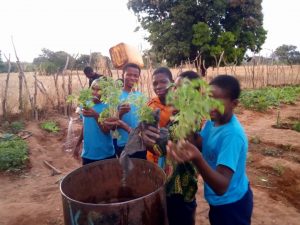Planting Seeds for the Future
Others, Agriculture , EducationContributed by: EduDeo Ministries
Imagine this: you’re a young man, enrolled at a CCAP high school in Zambia. You’re in Grade 10, but you know academics aren’t for you. Your grades won’t cut it for a university entrance exam, and because of that, you’re not interested in attending university. You attend school half-heartedly and by the end of Grade 10, you drop out.
You don’t belong to a farming family, so you can’t work at home. You head to the community of Lundazi, and you fall in with the wrong crowd – maybe getting involved with drugs or petty theft. You meet a girl, you get married, and you start a family. But you’re still without a job, and now you have a family to provide for. You get a job as a mechanic, but your boss is well known in the community for scamming customers – and you begin to as well.
For many young people around the world, this isn’t imaginary – this is their reality. Students are in school, learning academically, but the university entrance path is narrow, and academics aren’t everyone’s gifting. Unfortunately, this means there’s a huge part of the workforce that students aren’t graduating into.
Economies rely on a workforce of tradespeople – but students simply aren’t being trained in the skills they need for the trades. Even if they can become employed as a tradesperson, there may be negative societal beliefs about their place there. How can students influence communities and their societies when they aren’t a part of a major sector?
That’s where EduDeo’s partners come in. They have a different vision: students who graduate from high schools who know Christ, live as Him, and bring His message of hope and transformation to their communities, no matter what job they have and no matter what role they play in society.
Our partners dream of students graduating from their high schools who are well equipped to enter the workforce. They dream of graduating students who can work in their chosen field with honesty and integrity. They dream of students who will change societal expectations of their professions because those students are working for the glory of God.

And the best part is: they’re not just dreaming these things, they’re turning them into a new reality for students. Here are some ways five EduDeo partners integrate skills and trades training into their schools.
GHANA: INGH’s vocational school – the Centre for Empowerment & Enterprise Development – works with the vision and mission of “empowering young people through skilled training to be economically and socially independent, secure, and empowered to enable them to contribute to the development of society.” Students can study a variety of skills, including dress and hat making, tailoring, interior and floral decoration, catering, hotel management, hair dressing, barbering, massage, and esthetics.
HAITI: CRECH is running workshops for teachers on the topic of The Needs of the Labour Market. Jean, a recent participant, spoke excitedly about what this means for his students: “After this training, I am better equipped to do my job [as a teacher] and also able to supervise my students and give them all the necessary skills for their social development. They will be autonomous and will have the ability from a young age to create a small business and activities that will develop the community and also allow them to have their own pocket money.”
INDONESIA: Within Reformasi schools, the technical and commerce arms equip students with skills for a future in the trades, capable of financially supporting themselves and their families with meaningful work. Students are trained in such skills as farming, fishery, information technology, music, and sewing.
BURKINA FASO: AESEB is piloting its skills training programs with three schools in the eastern and western regions of Burkina Faso. These schools have on-campus gardens that teach students to plant, care for, harvest, and sell crops – developing their own skills, generating income for the schools, and providing the community with a reliable, quality food source. The success of the pilot program will encourage other schools to start their own programs.
ZAMBIA: Five CCAP schools work with students to empower them in animal husbandry (livestock farming), specifically poultry, fish, and pig farming. Schools – especially those who can’t charge tuition – find themselves desiring sustainability, and the agricultural programs are extremely important for this. Not only that, but students are able to develop their farming skills while still at school and be set up for success in their careers after graduation.

